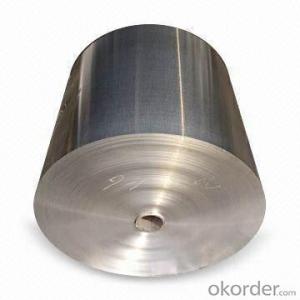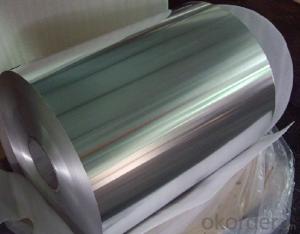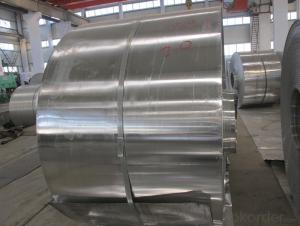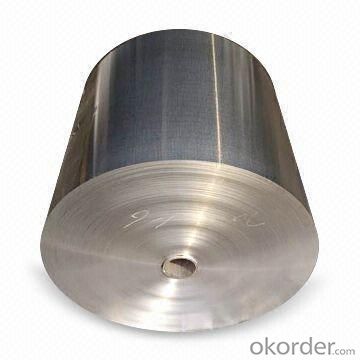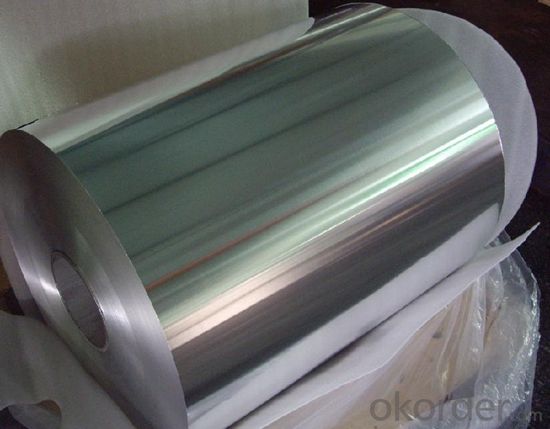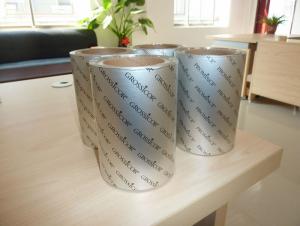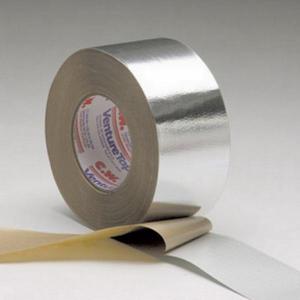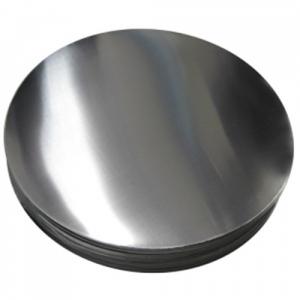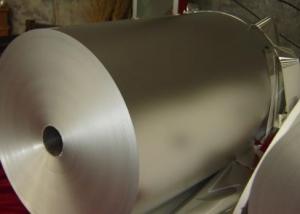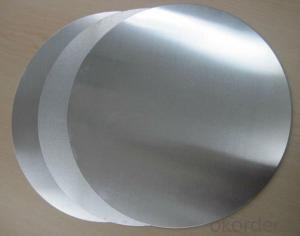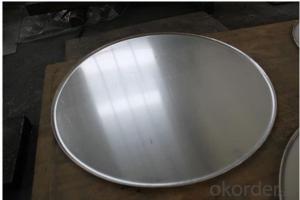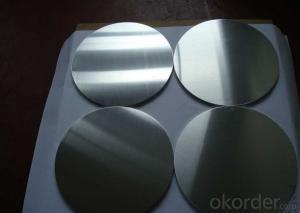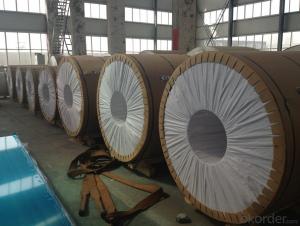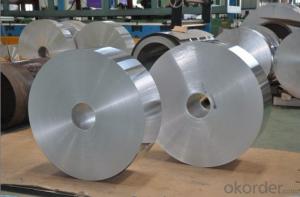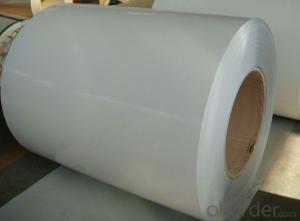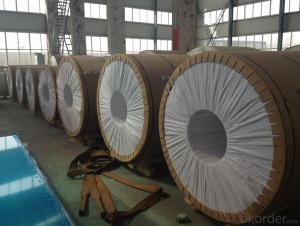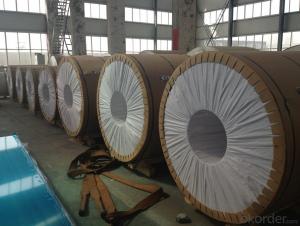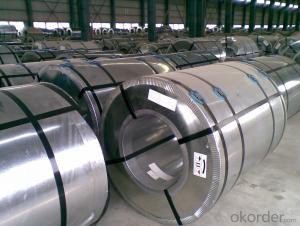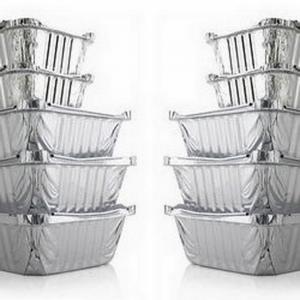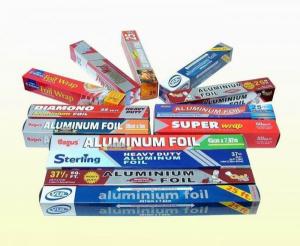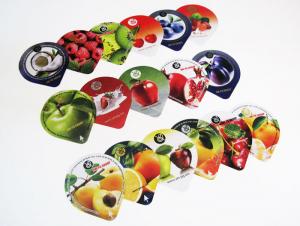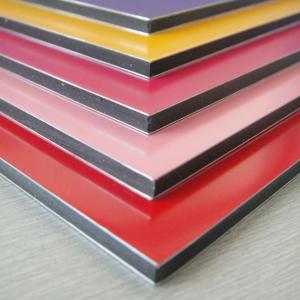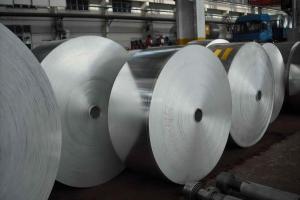Aluminum Hot Rolled and Cold Rolled Coils from China
- Loading Port:
- Shanghai
- Payment Terms:
- TT OR LC
- Min Order Qty:
- 5 m.t.
- Supply Capability:
- 100000 m.t./month
OKorder Service Pledge
OKorder Financial Service
You Might Also Like
Specification
Product Description
Alloy: 5052(AlMg2.5)
Temper: O,H12,H22,H32,H14,H24,H34,H16,H26,H36,H18,H38,F
CHEMICAL COMPOSITION LIMITS (%)
Silicon | Iron | Copper | Manganese | Magnesium | Chromium | Nickel | Zinc | Titanium | Others | Total | Aluminum |
0.25 | 0.4 | 0.10 | 0.10 | 2.2-2.8 | 0.15-0.35 | 0.10 | 0.05 | 0.15 |
Remainder |
Main application: Magnesium gives this alloy its enhanced corrosion resistance, workability, strength and weldability. Typical uses include aircraft fuel tanks, container body, truck/trailer body, electronic mounting plates and panels, fan blades, refrigeration liners, storm shutters and utensils.
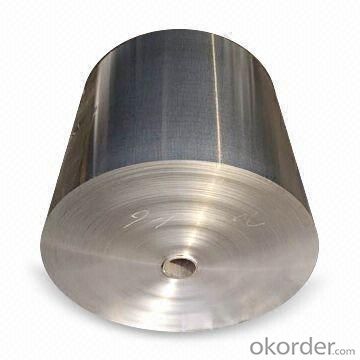
Mechanical Property Limits
Alloy | Temper | Thickness(mm) | Tensile Strength(MPa) | Elg%(50mm) |
5052 | O | >0.5-0.8 >0.8-1.3 >1.3-6.5 >6.5-10.0 | 170-215
| ≥15 ≥17 ≥19 ≥18 |
H12/H22/H32 | >0.5-1.3 >1.3-4.5 | 215-265 | ≥5 ≥7 | |
H14/H24/H34 | >0.5-0.8 >0.8-1.3 >1.3-4.5 | 235-285 | ≥3 ≥4 ≥6 | |
H16/H26/H36 | >0.5-0.8 >0.8-4.5 | 255-305 | ≥3 ≥4 | |
H18/H38 | >0.5-0.8 >0.8-4.5 | ≥270 | ≥3 ≥4 | |
H112 | >4.5-6.5 | ≥195 | ≥9 ≥7 | |
>6.5-12.5 | ≥195 | |||
>12.5-40.0 | ≥175 | |||
>40.0-80.0 | ≥175 |
Our Services
Payment: by 30%T/T in advance and balance before shipment or 100% L/C at sight
Delivery: within 30 days after we get your deposit or L/C.
Packing: sea worthy wooden pallet
Loading port: Qingdao/Shanghai/Tianjin, China
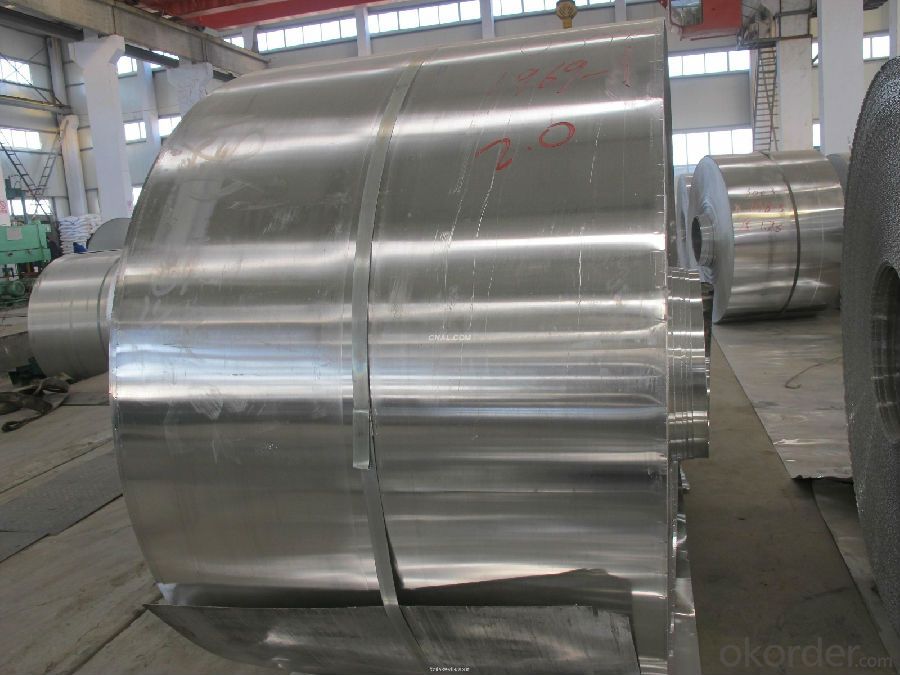
Aluminum Coil - Packaging
Standard Packaging
- Vertical axis packaging
- Core types: Fiber, Aluminum, Steel, Plastic
- Inner Diameter (ID) as required
- Outside Diameter (OD) as required
- Inserts as required
- Separators as required - cardboard or wooden slates
- Wooden Pallets or Crates
Custom Packaging
- Custom packaging, coil weights, inner diameters and outer diameters are available upon request.
Export Packaging
- Export packaging in conformance with IPPC International Standards is available upon request.
Aluminum Coil - Custom Finishes
Painting, Anodizing and Other Coatings
- Polyester, Acrylic, Silicone Polyester, Kynar (Flouropolymer), Krystal Kote, etc.
- All colors and gloss levels.
- One-side or two sides.
Aluminum Coil - Special Processing
- Cut-to-Length
- Tension Leveling
- Paper Interleaving
- Fine grain, minimum earring, anodizing quality
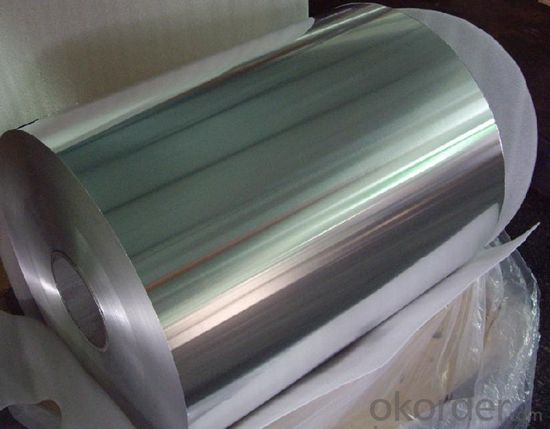
- Q: This question asks for a description of the characteristics that are inherent to pure aluminum.
- <p>Pure aluminum is a lightweight, silvery-white metal known for its excellent malleability, ductility, and electrical conductivity. It has a density of 2.7 g/cm鲁, which is about one-third that of steel. It is non-magnetic and has a low melting point of 660掳C (1220掳F). Pure aluminum is also highly reflective, making it useful in mirrors and reflective coatings. It is a good thermal conductor and is resistant to corrosion due to the formation of a protective oxide layer on its surface. However, it is soft and lacks strength, which is why it is often alloyed with other elements to improve its mechanical properties.</p>
- Q: Is it possible to utilize recycled aluminum in the manufacturing of solar panels or wind turbines?
- <p>Yes, recycled aluminum can be used in the production of solar panels and wind turbines. Recycled aluminum is often used in the manufacturing process due to its properties such as low density, high strength, and excellent corrosion resistance. In solar panels, it can be used for the frame and mounting structures, while in wind turbines, it is commonly used for the construction of the turbine blades and other components. The use of recycled aluminum not only reduces the environmental impact of mining new aluminum but also contributes to the sustainability of renewable energy technologies.</p>
- Q: Is it possible to recycle aluminum to create new products?
- <p>Yes, aluminum can be recycled and used to make new products. Aluminum is one of the most recycled materials in the world due to its lightweight, durability, and the fact that it can be recycled indefinitely without losing quality. Recycled aluminum saves energy and reduces waste, making it an environmentally friendly choice for manufacturing new products.</p>
- Q: What are some environmentally friendly options that can replace aluminum in various applications?
- <p>Sustainable alternatives to aluminum include biodegradable materials like bamboo and hemp, which can be used in construction and packaging. Stainless steel is a recyclable metal that can replace aluminum in many applications due to its durability and strength. Recycled aluminum itself is a sustainable option as it requires less energy to produce than new aluminum. Additionally, magnesium and titanium are lightweight metals that can be used in place of aluminum in certain industries. It's important to consider the specific application when choosing an alternative, as each material has its own set of properties and environmental impacts.</p>
- Q: This question asks for a brief overview of the characteristics or qualities of aluminum nitride, a chemical compound.
- <p>Aluminum nitride (AlN) is a covalent, ceramic material known for its exceptional properties. It has a high thermal conductivity, which is about two-thirds that of copper, making it useful in electronics for heat dissipation. It's also an electrical insulator, exhibiting high electrical resistivity. Aluminum nitride is characterized by its high thermal stability, resistance to thermal shock, and excellent mechanical strength. It's chemically inert, resistant to most acids and alkalis, and has a high melting point of approximately 2200掳C. These properties make it suitable for applications in high-temperature electronics, as a substrate for semiconductor devices, and in the automotive industry for heat sinks and other heat management components.</p>
- Q: This question asks for methods to prevent the corrosion of pure aluminum when exposed to environmental factors.
- <p>To prevent corrosion of pure aluminum in the environment, one can apply protective coatings such as paints or anodizing, which forms a dense oxide layer on the surface. Additionally, using aluminum alloys that contain elements like copper, magnesium, and silicon can enhance resistance to corrosion. Regular cleaning and maintenance to remove contaminants that may initiate corrosion are also important. In extreme environments, cathodic protection or the use of inhibitors can be employed to further protect aluminum from corrosion.</p>
- Q: This question asks for examples of alloys that include aluminum as one of their components.
- <p>Aluminum is a versatile metal that forms many alloys, enhancing properties like strength, corrosion resistance, and electrical conductivity. Some common aluminum alloys include: 1. 6061, used in aircraft structures and automotive parts due to its good mechanical properties and machinability. 2. 2024, known as 'Alclad', is strong and used in aircraft structures. 3. 7075, one of the strongest aluminum alloys, used in aerospace and military applications. 4. 3003, used for cooking utensils and chemical equipment due to its good corrosion resistance. 5. 5052, used in marine applications and food processing equipment for its excellent corrosion resistance. These alloys are widely used in various industries due to their unique properties.</p>
- Q: What benefits does aluminum offer compared to other metals?
- <p>Aluminum has several advantages over other metals, including its low density, which makes it lightweight and ideal for transportation applications. It also has excellent corrosion resistance due to the formation of a protective oxide layer. Aluminum is highly malleable and ductile, allowing it to be easily shaped and formed into various products. It is also a good conductor of heat and electricity, making it useful in electrical wiring and heat exchangers. Additionally, aluminum is abundant and relatively inexpensive compared to other metals, and it is recyclable, contributing to its sustainability.</p>
- Q: This question asks for an overview of the various types of aluminum alloys that exist.
- <p>Aluminum alloys are categorized into several series based on their primary alloying elements. The main types include: 1. 1xxx series: Pure aluminum alloys with 99.00% minimum aluminum content. 2. 2xxx series: Aluminum-copper alloys, known for their high strength. 3. 3xxx series: Aluminum-manganese alloys, which offer good formability and moderate strength. 4. 4xxx series: Aluminum-silicon alloys, used for welding wire and filler materials. 5. 5xxx series: Aluminum-magnesium alloys, characterized by good formability and corrosion resistance. 6. 6xxx series: Aluminum-silico-magnesium alloys, known for their high strength and excellent machinability. 7. 7xxx series: Aluminum-zinc-magnesium alloys, which are the strongest and most widely used in the aerospace industry. These alloys have various applications based on their unique properties, such as strength, corrosion resistance, and formability.</p>
- Q: What are some safety measures that should be taken into account when working with aluminum?
- <p>When working with aluminum, it's important to follow several safety precautions. Always wear appropriate personal protective equipment (PPE) such as gloves, safety glasses, and a dust mask to protect against aluminum dust. Ensure proper ventilation to avoid inhaling aluminum dust or fumes. Use spark-resistant tools when cutting or welding aluminum to minimize the risk of fire. Keep a fire extinguisher nearby and be aware of the flammability of aluminum. Store aluminum in a dry, cool place to prevent it from reacting with moisture. Lastly, be cautious when handling aluminum alloys, as some can be more reactive or hazardous than pure aluminum.</p>
Send your message to us
Aluminum Hot Rolled and Cold Rolled Coils from China
- Loading Port:
- Shanghai
- Payment Terms:
- TT OR LC
- Min Order Qty:
- 5 m.t.
- Supply Capability:
- 100000 m.t./month
OKorder Service Pledge
OKorder Financial Service
Similar products
Hot products
Hot Searches
Related keywords
